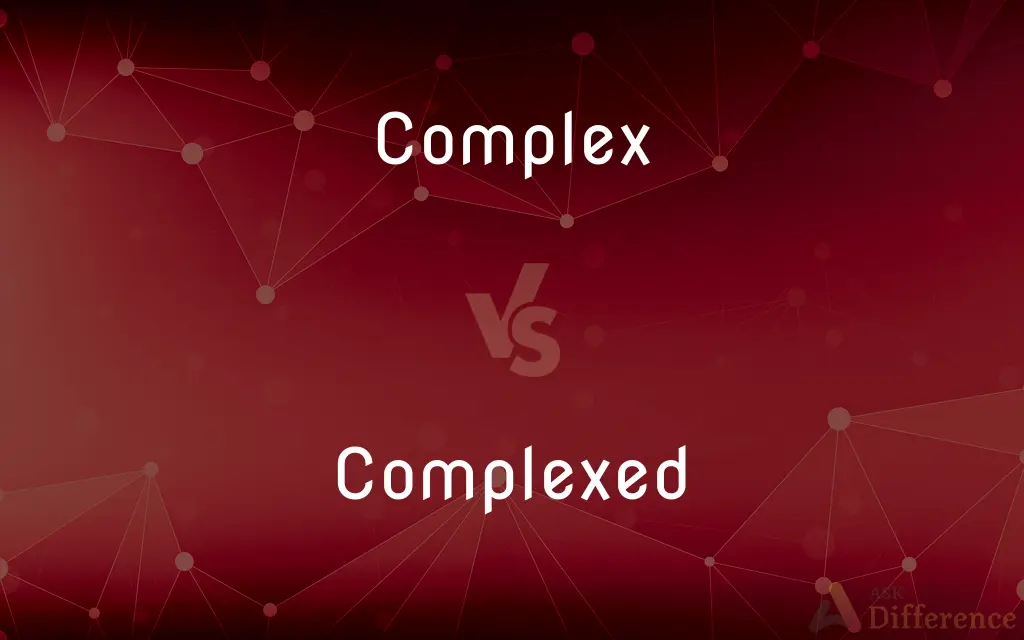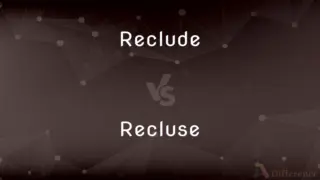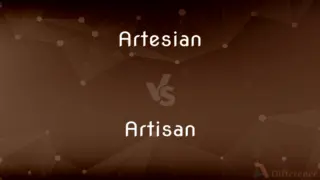Complex vs. Complexed — What's the Difference?
By Fiza Rafique & Maham Liaqat — Updated on February 23, 2024
"Complex" can be a noun denoting a group of related buildings or facilities, or an adjective describing something intricate. "Complexed," primarily used as an adjective in psychology, refers to having or being characterized by psychological complexes.

Difference Between Complex and Complexed
Table of Contents
ADVERTISEMENT
Key Differences
As a noun, "complex" refers to a collection of related buildings or facilities designed for a specific purpose, such as a sports complex or an apartment complex. When used as an adjective, it describes something that is intricate, complicated, or multifaceted, like a complex problem or a complex machine, indicating a high level of components or ideas.
"Complexed," on the other hand, is less commonly used and primarily found in psychological contexts. It describes individuals or personalities that are influenced or dominated by one or more psychological complexes.
A complex is a core pattern of emotions, memories, perceptions, and wishes in the personal unconscious organized around a common theme. When someone is described as "complexed," it suggests that their behavior or thought patterns are significantly affected by these unconscious influences, such as an inferiority complex affecting self-perception and interactions.
The distinction between the two terms lies in their usage and context. "Complex" is widely used across various fields to denote complexity or a group of related entities, while "complexed" is specialized, mainly pertaining to psychological conditions and rarely used outside this scope. Understanding the difference is crucial for accurate communication, particularly in professional or academic settings where precision in language is essential.
Comparison Chart
Definition (Noun)
A group of related buildings or facilities.
Not applicable as "complexed" is not used as a noun.
ADVERTISEMENT
Definition (Adjective)
Describes something intricate, complicated, or multifaceted.
Describes someone influenced by psychological complexes.
Usage
Broad, across various fields and contexts.
Specialized, mainly in psychology.
Context
Can refer to physical structures, problems, systems, etc.
Refers to personalities or behaviors shaped by complexes.
Examples
Apartment complex, complex machinery, complex issue.
A person complexed by early childhood experiences.
Compare with Definitions
Complex
Composed of many parts:
The museum's complex layout made it difficult to find the exit.
Complexed
Affected by a psychological complex:
He seemed complexed by an intense fear of failure.
Complex
Not easy to analyze or understand:
The novel's plot was complex and engaging.
Complexed
In chemistry, relating to complex formation:
The ions complexed with each other under certain conditions.
Complex
A group of interconnected buildings:
The sports complex includes a pool and a gymnasium.
Complexed
Used less commonly in general discourse:
The term complexed is less understood in everyday conversations.
Complex
In chemistry, a compound formed from molecules:
The protein formed a complex with the metal ions.
Complexed
Exhibiting behaviors stemming from deep-seated emotional issues:
Her actions were often complexed by her past experiences.
Complex
In mathematics, involving imaginary numbers:
Complex numbers have both real and imaginary parts.
Complexed
Having an intricate and unresolved emotional state:
His complexed feelings towards his family complicated relationships.
Complex
Assemblage of related things; collection; complication.
This parable of the wedding supper comprehends in it the whole complex of all the blessings and privileges exhibited by the gospel.
Complexed
Simple past tense and past participle of complex.
Complex
Consisting of interconnected or interwoven parts; composite
Complex equipment with multiple components.
Complexed
(obsolete) complex, complicated.
Complex
A building or group of buildings used for a single purpose
A sports complex.
Complexed
Complex, complicated.
Complex
A network of interconnected systems.
Military-industrial complex
Common Curiosities
What is a psychological complex?
A core pattern of emotions, memories, and desires in the personal unconscious, organized around a common theme, affecting thoughts and behaviors.
Can a machine be described as complexed?
No, "complexed" is specific to psychology. A machine would be described as "complex" due to its intricate parts and functions.
How can someone know if they are complexed?
It often requires psychological analysis or therapy to uncover and understand underlying complexes that influence behavior.
Is "complexed" commonly used in everyday language?
No, it's specialized terminology primarily used in psychological contexts.
Are all complex individuals complexed?
Not necessarily. Someone can have a complex personality without being dominated by psychological complexes.
Can an organization be complexed?
An organization can be complex due to its structure and dynamics, but "complexed" would not apply as it pertains to individual psychology.
Do complexes always impact behavior significantly?
The impact varies; some complexes might subtly influence behavior, while others have profound effects.
Is "complexed" a negative term?
It's descriptive, not inherently negative, but it implies challenges due to underlying psychological issues.
Is the term "complexed" recognized in all psychological schools?
It's more commonly associated with psychoanalytic and psychodynamic theories and may not be as prevalent in other psychological approaches.
Can a building complex be complex?
Yes, a building complex can be complex if it has a complicated structure or design.
Can a problem be both complex and complexed?
A problem can be complex due to its intricacy, but "complexed" would not apply as it refers to psychological conditions in individuals.
How does one address being complexed?
Addressing psychological complexes typically involves therapeutic interventions to understand and integrate these unconscious influences.
Is there a way to simplify a complex system without losing functionality?
Simplification can be achieved through optimization and streamlining processes, but it depends on the system's inherent requirements and constraints.
Can a complex be positive?
While complexes often have challenging effects, they can also lead to positive behaviors or achievements when understood and managed.
Can a story be described as complexed?
A story can be complex in terms of plot and characters, but "complexed" would not be appropriate unless referring to characters' psychological states.
Share Your Discovery

Previous Comparison
Reclude vs. Recluse
Next Comparison
Artesian vs. ArtisanAuthor Spotlight
Written by
Fiza RafiqueFiza Rafique is a skilled content writer at AskDifference.com, where she meticulously refines and enhances written pieces. Drawing from her vast editorial expertise, Fiza ensures clarity, accuracy, and precision in every article. Passionate about language, she continually seeks to elevate the quality of content for readers worldwide.
Co-written by
Maham Liaqat














































